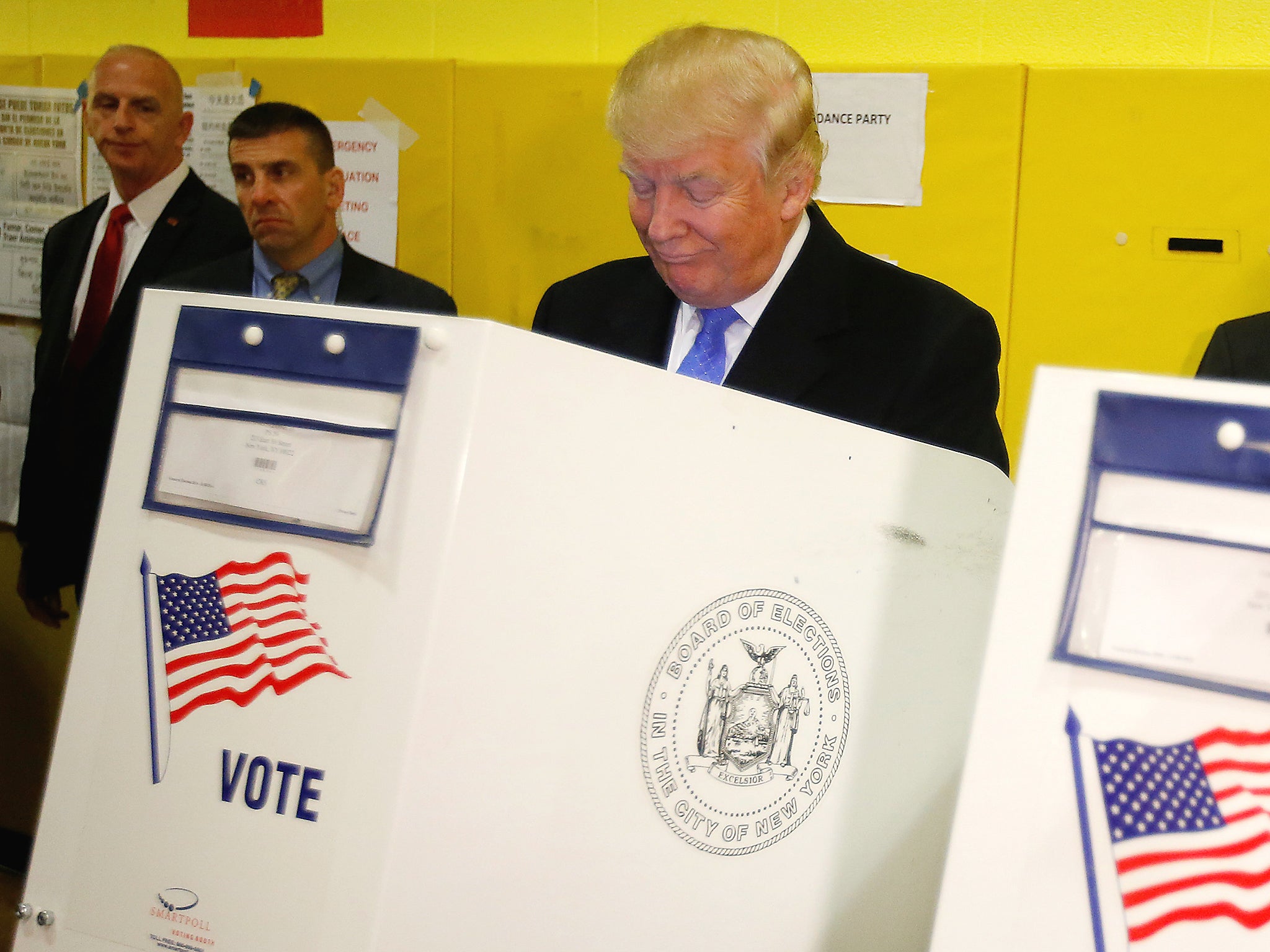Key battleground states that voted for Donald Trump had turnout suppressed by local laws, experts say
Turnout was central to the election, since it was won more Democrat voters who didn't cast their ballots than Republicans one who did

Voting restrictions across the US helped limit turnout, especially in some of the battleground states won by Donald Trump.
Issues including restrictions on voter ID, reducing early voting and shutting down polling stations helped keep many people from voting, according to experts. Those issues appear to have particularly impacted on minority communities and especially in those close states that won the election for Mr Trump.
In some of the states, the margins between Trump and Democrat Hillary Clinton were simply too great for those restrictions to have been a deciding factor. But in Wisconsin, one poll monitor said the roughly 27,000-vote difference was concerning given the turmoil surrounding the state's voter ID law.
As many as 300,000 Wisconsin voters did not have the required photo ID. With lower than expected turnout, Trump was the first Republican to win the state since Ronald Reagan in 1984.
Fourteen states had new voting or registration restrictions in place for the 2016 presidential election, raising concerns that minority voters in particular would have a harder time accessing the ballot box.
Voting experts believe the laws had some effect on turnout this year, but said it would be difficult to measure against other factors — such as a lack of enthusiasm for either Donald Trump or Hillary Clinton and the decision of many people simply not to vote.
They expressed frustration that some states had made it more difficult for voters to participate, even if there is no evidence the changes influenced the outcome of the presidential election.
“There were clearly many people who bore the brunt of new voting restrictions or who were otherwise unable to participate, and that is not acceptable in a democracy,” said Wendy Weiser, head of the democracy program at the Brennan Center for Justice at NYU's School of Law.
She said a few battleground states won by Trump were among the states that had enacted restrictions in recent years, including Florida, Ohio, North Carolina and Wisconsin.
In some of the states, the margins between Trump and Clinton were simply too great for voting restrictions to have been a deciding factor. But Weiser said the roughly 27,000-vote difference in Wisconsin was concerning, given the turmoil surrounding the state's voter ID law. With lower than expected turnout, Trump was the first Republican since Ronald Reagan in 1984 to win the state.
It's been estimated that as many as 300,000 Wisconsin voters did not have the required photo ID. Molly McGrath, with the national group VoteRiders, spent Tuesday fielding dozens of calls from voters who had questions about the law.
In one case, she picked up a 99-year-old retired university professor named Fred at his polling place and drove him to a DMV office so he could get his photo ID. He had let his license expire, preferring instead to walk or ride his bike.
“How many Freds are there? How many Freds decided not to call?” McGrath said. “There is 100 percent no doubt in my mind that people fell through the cracks and didn't have their votes counted. And when we see the numbers of how close this election was, we should all be unsettled by that.”
With black and Hispanic voters, Trump apparently did as well as Republican Mitt Romney when Romney lost to President Barack Obama in 2012, according to exit polls. Trump appeared to have won more than half of white voters, who made up 70 percent of the electorate.
The 2016 election was the first without a key enforcement provision of the Voting Rights Act that had required some states and counties to receive approval before enacting new election laws. The 2013 U.S. Supreme Court ruling setting aside that requirement opened the way for voter ID and other measures that reduced early voting, straight-ticket voting and same-day registration. Those actions were taken primarily by Republican lawmakers, who said they were targeting voter fraud.
Even though court decisions have rolled back some of the more far-reaching restrictions, civil rights groups were concerned that confusion over the laws could deter voters.
Sandy Fambrough, a deputy poll judge in Denton County, Texas, said she witnessed violations of court-ordered changes to the state's voter ID law.
Texas was forced to soften its voter ID law after a federal appeals court deemed it discriminatory. Under the original law, it was estimated that some 600,000 eligible voters didn't have an acceptable form of ID.
“Who knows how many people didn't vote because they were given the wrong information?” Fambrough said.
In North Carolina, voter ID requirements and early voting reductions were struck down after a federal appeals court said they “target African Americans with almost surgical precision.” Republican officials have said discrimination was not their intent.
After some North Carolina counties reduced hours and polling places during the first week of early voting, one researcher found black turnout was down 13 percent compared with the 2012 election. On Tuesday, Trump won the state by about 178,000 votes over Clinton.
“Even if those states didn't have those laws, it's not at all clear that the outcome would have been any different,” said Rick Hasen, an election law expert and professor at UC Irvine's School of Law.
He said he would not be surprised if more states pass restrictive voting laws in the years to come.
“It's not hard to imagine that this will give a green light to engage in ever more restrictive voting laws,” he said.
Additional reporting by agencies
Join our commenting forum
Join thought-provoking conversations, follow other Independent readers and see their replies
Comments